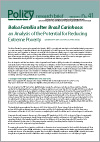
Bantuan Siswa Miskin (BSM): Indonesian Cash Transfer Programme for Poor Students
Resumo:The Government of Indonesia places a high priority on the universal provision of, and access to, education. Universal educationis considered a cornerstone for future economic development and shared prosperity. Over the past decade, the Government ofIndonesia has introduced a number of major reforms to make universal education a reality. In 2003, the Ministry of Educationand Culture (MoEC) and the Ministry of Religious Affairs (MoRA) began implementing the Nine-Year Compulsory Basic EducationProgramme (Wajib Belajar Sembilan Tahun) with the aim of encouraging school-age children to complete junior secondaryeducation. In 2005, a school-based education subsidy programme known as School Operational Assistance (Bantuan OperasionalSekolah — BOS) was introduced to provide grants directly to primary and junior secondary schools on a per student basis. TheBOS grants were designed to cover direct educational costs but not indirect costs associated with education (i.e. transportationcosts, uniforms etc.), which are recognised as being a major barrier to access for lower-income households.
Você também pode baixar em outras línguas:



